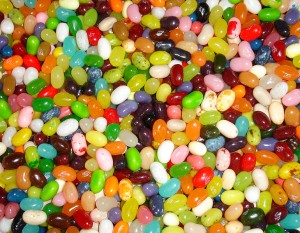Free Will: Candy has Consequences
F or years, I guarded the kids’ Easter baskets like the soldiers outside of Christ’s tomb. I’d monitor them vigilantly – if I could have rolled a stone in front of them, I would have. I wanted the children to make the contents last and to really appreciate the treats inside rather than just wolfing them down and forgetting about the meaning behind them. Additionally, being the health conscience mother that I am, I worried that too many sweets at once would make them sick.
or years, I guarded the kids’ Easter baskets like the soldiers outside of Christ’s tomb. I’d monitor them vigilantly – if I could have rolled a stone in front of them, I would have. I wanted the children to make the contents last and to really appreciate the treats inside rather than just wolfing them down and forgetting about the meaning behind them. Additionally, being the health conscience mother that I am, I worried that too many sweets at once would make them sick.
After a while, I started feeling more like a cop running a speed trap than a mother fostering a holiday tradition. Not only that, but it was annoyingly time consuming to keep an eye on the baskets all the time. Enough was enough! One Easter after Mass I piled the Easter baskets in the middle of the dining room table.
“Here you go,” I said. “Eat all you want when you want to eat it.”
“Huh?” the kids asked, completely perplexed.
“That’s right. You can decide for yourselves when to eat your candy,” I smiled. I could tell they were wondering if I’d gone off my rocker.
“You sure?” Monica asked suspiciously.
“Yup,” I responded confidently. “There’s just one rule.”
They rolled their eyes waiting for the catch. “What is it?” they moaned.
“He who throws it up, cleans it up,” I smirked. Then I turned and walked out of the room, never looking back. That was the end of the battle.
God’s gift of free will is a bit like my “gift” of the Easter baskets to our kids. He gave us a world filled with good things; it’s up to us when and how to appreciate them. When we appreciate them too much or inappropriately, we can find ourselves sickening our souls with sin. That’s true of everything in our lives, not just consumables. Technology, entertainment, fashion, possessions, and property all can be over-done or wrongly-done if we don’t vigilantly guard our use of them and our attitude toward them.
Similarly to my backing off of the kids Easter baskets out of frustration, the heavenly Father “backs off”, so to speak, in giving us free will out of complete, encompassing, incomprehensible (to our human hearts) love. He wants the choice to be ours; he will not force us to eat or not eat the treats he’s provided for us. He’ll not force us to love and honor him; he wants us to turn to him of our own accord. When our faulty reasoning leads us to sin, he does require us to clean up our own messes, figuratively speaking, by receiving the Sacrament of Reconciliation. While he never takes his protective shield from around us, he knows that some lessons are best learned through experience, even when it’s unpleasant or difficult.
My Easter basket tactic was meant to help our children to become self-limiting and to teach myself how to let go and let them learn on their own. The best way to see the folly of our ways is to have to deal with the consequences ourselves. My seemingly harsh, “He who throws it up, cleans it up” was a step toward making our children ready and able to independently and autonomously live their lives as children of God out of love for God.
In a sense, that’s what Lent has been about. The Church leads us to examine our ways and gives us the opportunity to clean up after ourselves through prayer, fasting, abstinence, penance, and almsgiving. We’ve had a chance to taste a bit of the Lord’s Passion and now we look forward to partaking of the sweetness of his Resurrection.
(© 2011 Marge Fenelon)

